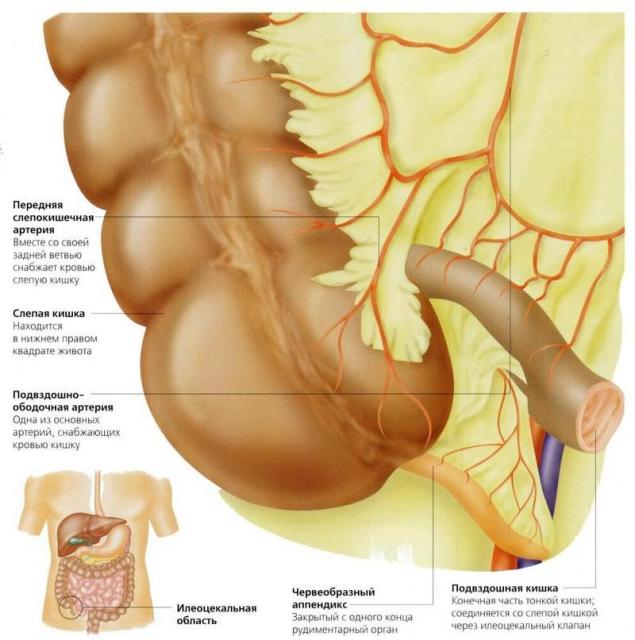The Appendix is not as useless as previously thought
 Bashny.Net
Bashny.Net
There is a law: in nature, everything is for something you need, anything extra just yet.
The human body is one of the most complex systems. So, the complexity of one cubic millimeter each tissue in our body is comparable with all appliances produced by the civilization. Studying the structure of the body, does not cease to be amazed at the harmony and rationality of the system. Of course, like everything in this world, this system is not eternal, and sometimes breaks. But, be that as it may, quite reasonably believed that Homo sapiens in the body there is no excess.
However, the attentive reader will immediately ask – then why do we need an Appendix? This worm-like segment, causing so many problems?

Each year 4-5 people out of 1,000 are diagnosed with acute appendicitis, the Appendix is a leader among the diseases of the abdominal cavity requiring surgical treatment. Besides, do not forget about numerous complications, like abscess and peritonitis. It may seem that this appendage or rudiment (a relic of the past), or even a mistake of nature.
The Appendix or vermiform Appendix is an appendage of the cecum, which departs from its posterolateral wall. Has the shape of a cylinder whose length is from 6 to 12 cm and a diameter of 6-8 mm. the Appendix may be located on the side, below and even behind the cecum, and sometimes it is adjacent to the ureter or the kidney. If the Appendix is unusual, it makes diagnosis of inflammation and impedes the progress of the operation.
In the wall of the Appendix there are many lymphatic vessels, creating a single network. It lymph flowing or lymph nodes, or "solitary follicles" that contain lymphoid tissue. So, this on the most powerful lymphatic apparatus.

It is known that the human Appendix, although is part of the gastrointestinal tract, is not involved in the process of digestion. But in herbivorous animals it reaches a length of several meters and is a kind of "warehouse" for a large volume of food. This food is digested thanks to the work of billions of microorganisms that break down cellulose in large quantities in plants.
Since in humans the Appendix such work is not engaged, decided that the use of it is less than harm, and remove it is necessary without waiting for appendicitis.
Americans, for example, began to remove the Appendix in infants and has received several distressing phenomena. The children observed the disorder of the ability to digest breast milk, they are lagging behind in mental and physical development, which was associated with impaired digestion and depending on its development and growth. Also, these children were more susceptible to infectious disease, and after intestinal infections, they often develop goiter.
Similar experiments in the 30-ies of the last century were conducted in Germany and got similar results.
Today we know that the Appendix performs a number of important functions. As already mentioned, the Appendix contains much lymphoid tissue and the lymphatic system is very important for the immune defense. The Appendix performs a barrier function in inflammatory diseases of the digestive tract. But this is the reason for its vulnerability – it accounts for the first blow. It's a bit like the function of the Palatine tonsils. Some doctors called the Appendix – "intestinal tonsil".
Not long ago the Americans are taking revenge for your bad experience, proved another function of the Appendix. Researchers of the Medical school of Duke University it was found that the Appendix is a repository of bacteria. So what's the deal?
We all know that the human intestinal normal lives, a huge number of microorganisms involved in digestion and protects the body from harmful "foreign" bacteria. Between "beneficial bacteria" and the man establishes a symbiosis – a mutually beneficial existence. Our bacteria are getting the house and food, and bacteria help us to digest food and even from "enemies" to protect. If the immune system is weak, then they too will become "enemies".
Here's the necessary barrier function of the Appendix. In case of intestinal infections, accompanied by diarrhea, our bacteria-symbionts and intestinal contents out of our body is not the most pleasant way. But some of the bacteria stays in the Appendix, and from it originates a new population. If the Appendix was removed, after the removal of the infection, dysbacteriosis, so often found in children who in infancy had an emergency appendectomy.
A recent study justify the presence of the Appendix in the human body, indicating that innate lymphoid cells (ILC), which in large quantities contained in the caecum, protect people with a weakened immune system from infection.
"We have conducted experiments on laboratory mice, says Gabrielle Belz from the Institute of medical research Walter and Eliza Hall in Melbourne. — The aim of our study was to examine the role of innate lymphoid cells found in the stomach of mammals, as well as their influence on the immune system and the digestive channel."
In the study, it was found that innate lymphoid cells in varying degrees are present in all membranes of the body, including the skin, lungs, stomach and reproductive tract, but in Appendix to them the most.
"These cells play an important role in protecting the body from infection," — said Gabrielle Belz, Institute of medical research Walter and Eliza Hall in Melbourne.
Although the Appendix and does not participate in the process of digestion, but it is live bacteria that are of great importance for the overall state of the stomach, especially in cases when entered into the body of the infection leads to diarrhea. Infectious inflammation of this kind destroy benign bacteria.
As the results show, after infecting the population of microorganisms required for the normal functioning of the stomach, supplemented by bacteria living in the Appendix, the number of which depends on the number of innate lymphoid cells.
"A diet consisting of cruciferous vegetables and herbs helps to increase the production of lymphoid cells in the body," says Gabrielle Belz.
The uniqueness of lymphoid cells lies in the fact that they are more viable than other types of immune cells: only innate lymphoid cells can survive chemotherapy and to help the body to support the immune system weakened by cancer.
Belz argues that once the medical community is fully aware of the exceptional place that the Appendix is in the body's immune system, surgeons will be much less likely to make decisions about deleting it.
"In mild cases of appendicitis, to stop the inflammatory process, is to resort to the use of antibiotics, and not to consider surgery as the only possible way to help the patient," says Australian immunologist.
According to scientists, to take a number of additional studies in order to understand the role played by the lymphoid cells contained in the Appendix, in the fight against such diseases as asthma, inflammatory bowel disease and psoriasis.published
P. S. And remember, only by changing their consumption — together we change the world! ©
Join us in Facebook , Vkontakte, Odnoklassniki
Source: masterok.livejournal.com/2726696.html
The human body is one of the most complex systems. So, the complexity of one cubic millimeter each tissue in our body is comparable with all appliances produced by the civilization. Studying the structure of the body, does not cease to be amazed at the harmony and rationality of the system. Of course, like everything in this world, this system is not eternal, and sometimes breaks. But, be that as it may, quite reasonably believed that Homo sapiens in the body there is no excess.
However, the attentive reader will immediately ask – then why do we need an Appendix? This worm-like segment, causing so many problems?

Each year 4-5 people out of 1,000 are diagnosed with acute appendicitis, the Appendix is a leader among the diseases of the abdominal cavity requiring surgical treatment. Besides, do not forget about numerous complications, like abscess and peritonitis. It may seem that this appendage or rudiment (a relic of the past), or even a mistake of nature.
The Appendix or vermiform Appendix is an appendage of the cecum, which departs from its posterolateral wall. Has the shape of a cylinder whose length is from 6 to 12 cm and a diameter of 6-8 mm. the Appendix may be located on the side, below and even behind the cecum, and sometimes it is adjacent to the ureter or the kidney. If the Appendix is unusual, it makes diagnosis of inflammation and impedes the progress of the operation.
In the wall of the Appendix there are many lymphatic vessels, creating a single network. It lymph flowing or lymph nodes, or "solitary follicles" that contain lymphoid tissue. So, this on the most powerful lymphatic apparatus.

It is known that the human Appendix, although is part of the gastrointestinal tract, is not involved in the process of digestion. But in herbivorous animals it reaches a length of several meters and is a kind of "warehouse" for a large volume of food. This food is digested thanks to the work of billions of microorganisms that break down cellulose in large quantities in plants.
Since in humans the Appendix such work is not engaged, decided that the use of it is less than harm, and remove it is necessary without waiting for appendicitis.
Americans, for example, began to remove the Appendix in infants and has received several distressing phenomena. The children observed the disorder of the ability to digest breast milk, they are lagging behind in mental and physical development, which was associated with impaired digestion and depending on its development and growth. Also, these children were more susceptible to infectious disease, and after intestinal infections, they often develop goiter.
Similar experiments in the 30-ies of the last century were conducted in Germany and got similar results.
Today we know that the Appendix performs a number of important functions. As already mentioned, the Appendix contains much lymphoid tissue and the lymphatic system is very important for the immune defense. The Appendix performs a barrier function in inflammatory diseases of the digestive tract. But this is the reason for its vulnerability – it accounts for the first blow. It's a bit like the function of the Palatine tonsils. Some doctors called the Appendix – "intestinal tonsil".
Not long ago the Americans are taking revenge for your bad experience, proved another function of the Appendix. Researchers of the Medical school of Duke University it was found that the Appendix is a repository of bacteria. So what's the deal?
We all know that the human intestinal normal lives, a huge number of microorganisms involved in digestion and protects the body from harmful "foreign" bacteria. Between "beneficial bacteria" and the man establishes a symbiosis – a mutually beneficial existence. Our bacteria are getting the house and food, and bacteria help us to digest food and even from "enemies" to protect. If the immune system is weak, then they too will become "enemies".
Here's the necessary barrier function of the Appendix. In case of intestinal infections, accompanied by diarrhea, our bacteria-symbionts and intestinal contents out of our body is not the most pleasant way. But some of the bacteria stays in the Appendix, and from it originates a new population. If the Appendix was removed, after the removal of the infection, dysbacteriosis, so often found in children who in infancy had an emergency appendectomy.
A recent study justify the presence of the Appendix in the human body, indicating that innate lymphoid cells (ILC), which in large quantities contained in the caecum, protect people with a weakened immune system from infection.
"We have conducted experiments on laboratory mice, says Gabrielle Belz from the Institute of medical research Walter and Eliza Hall in Melbourne. — The aim of our study was to examine the role of innate lymphoid cells found in the stomach of mammals, as well as their influence on the immune system and the digestive channel."
In the study, it was found that innate lymphoid cells in varying degrees are present in all membranes of the body, including the skin, lungs, stomach and reproductive tract, but in Appendix to them the most.
"These cells play an important role in protecting the body from infection," — said Gabrielle Belz, Institute of medical research Walter and Eliza Hall in Melbourne.
Although the Appendix and does not participate in the process of digestion, but it is live bacteria that are of great importance for the overall state of the stomach, especially in cases when entered into the body of the infection leads to diarrhea. Infectious inflammation of this kind destroy benign bacteria.
As the results show, after infecting the population of microorganisms required for the normal functioning of the stomach, supplemented by bacteria living in the Appendix, the number of which depends on the number of innate lymphoid cells.
"A diet consisting of cruciferous vegetables and herbs helps to increase the production of lymphoid cells in the body," says Gabrielle Belz.
The uniqueness of lymphoid cells lies in the fact that they are more viable than other types of immune cells: only innate lymphoid cells can survive chemotherapy and to help the body to support the immune system weakened by cancer.
Belz argues that once the medical community is fully aware of the exceptional place that the Appendix is in the body's immune system, surgeons will be much less likely to make decisions about deleting it.
"In mild cases of appendicitis, to stop the inflammatory process, is to resort to the use of antibiotics, and not to consider surgery as the only possible way to help the patient," says Australian immunologist.
According to scientists, to take a number of additional studies in order to understand the role played by the lymphoid cells contained in the Appendix, in the fight against such diseases as asthma, inflammatory bowel disease and psoriasis.published
P. S. And remember, only by changing their consumption — together we change the world! ©
Join us in Facebook , Vkontakte, Odnoklassniki
Source: masterok.livejournal.com/2726696.html
Tags
See also
Pearls from the writings of the exam in 2013
How to learn to get up early
What is chicory and how to apply it?
Corals appeared 240 million years earlier than previously thought
Things animals do as well as people
Watermelon acts on the body in the same way as Viagra
Dalai Lama: "Aliens are the same as we are, even if they differ in appearance"
"Drying" Mars takes longer than previously thought

















